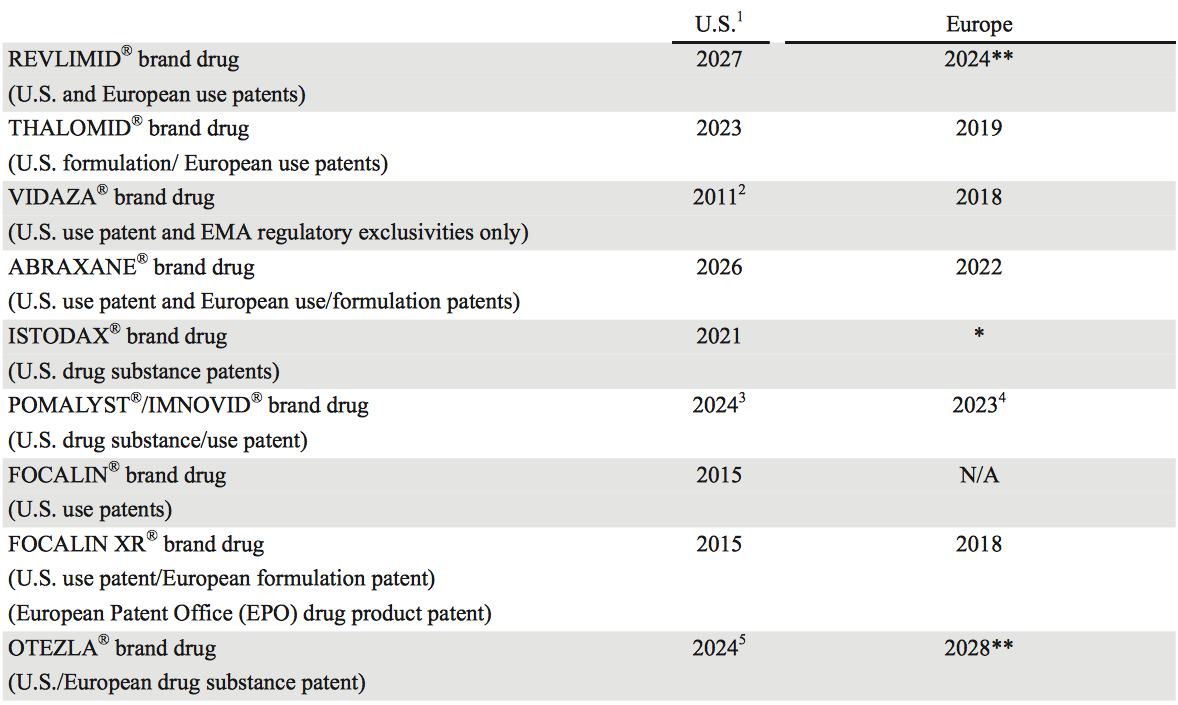Biopharmaceutical company Celgene (CELG +0.00%) is up more than 400% over the past five years, smashing the market's return and making a small fortune for long-term investors.
Despite the huge run, there are plenty of reasons to be bullish on Celgene's stock. Here are five reasons Celgene is still a buy today.
Celgene's best-selling and most well-known medication is Revlimid, a drug that treats a variety of types of blood cancer such as multiple myeloma, mantle cell lymphoma, and myelodysplastic syndromes. Sales of Revlimid approached $5 billion in 2014, up a strong 16% over the prior year, and they show no signs of slowing down anytime soon.
Celgene has been investing heavily in expanding the labeling for Revlimid to treat other forms of cancer, such as chronic lymphocytic leukemia, and it currently boasts eight additional indications either in phase 3 clinical trials or currently pending regulatory approval.
Revlimid has a good history of successfully navigating the regulatory pathway, so odds are good that it will continue to gain label expansion, which means Revlimid should continue to grow for years to come.
2. Fast growth in other medications
While Revlimid certainly grabs all of the headlines because of its multibillion-dollar sales numbers, Celgene has several other medications that are growing quickly and could soon become billion-dollar franchises themselves. Abraxane, which treats various types of cancer, grew a strong 30% in 2014 to more than $840 million in sales.
Pomalyst/Imnovid, which treats multiple myeloma, grew 122% to nearly $680 million in total sales. Each of these drugs is well positioned to continue to grow for years to come, and they should help to diversify the company's future revenue.
While blockbuster drugs can provide tremendous revenue growth, they also come with a pesky patent expiration date. When blockbuster drugs lose patent protection, they become ripe targets for generic competition, which usually means sales take a nose dive when patents expire.
Celgene looks to be in good shape, as most of its best-selling and highest-growth drugs appear to be protected well into the 2020s.

Source: Celgene 10-K.
Beyond its own trials, Celgene has developed a number of partnerships with a huge list of other companies, and it made news recently on two exciting deals.
First, Celgene made a $1 billion investment in Juno Therapeutics (JUNO +0.00%) and announced a 10-year collaboration to co-develop a variety of treatments for patients with cancer and autoimmune diseases. Initially, the partnership will focus on an exciting cancer treatment therapy called chimeric antigen receptor technology, which is Juno's drug development platform that helps the body identify cancer cells and signal to the immune system to attack.
Celgene also just spent $7.2 billion to acquire Receptos (NASDAQ: RCPT), which has developed a very promising drug callled ozanimod, designed to treat inflammatory bowel disease and multiple sclerosis; it's currently in phase 3 trials.
Each of these deals will take years before Celgene will see any revenue, but they certainly show that it is more than willing to put its cash resources to work to strengthen its pipeline.

Source: Celgene.
Of course, none of these attributes are hidden to the market, which is why investors have bid the stock up to a trailing price-to-earnings ratio of around 46 times, making the stock look quite expensive. However, Celgene is targeting 2020 product sales to reach $21 billion, with diluted earnings per share to exceed $13.00 at that time. It's rare for a management team to make long-term targets like that public, and it should speak to its confidence in the company's future.
Taking it all together, when you consider how well positioned Celgene is to continue to grow from here, there are plenty of reasons to be bullish on Celgene's stock today, even with the high price tag.








